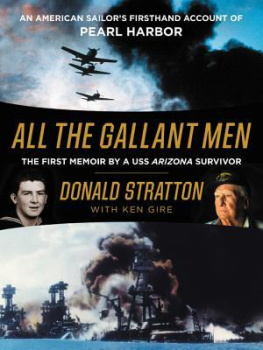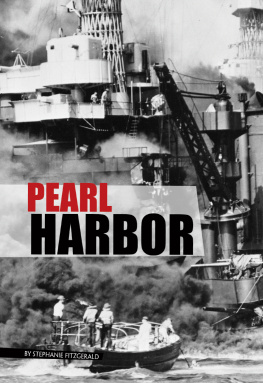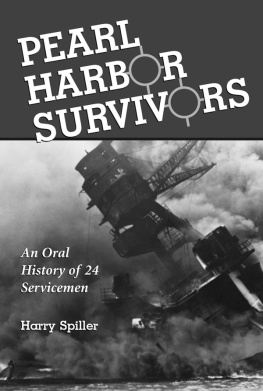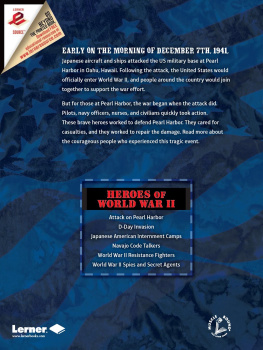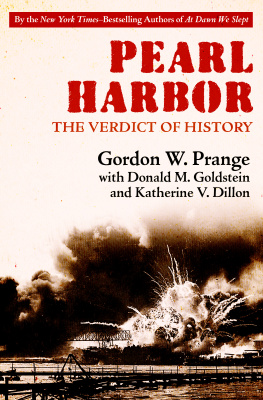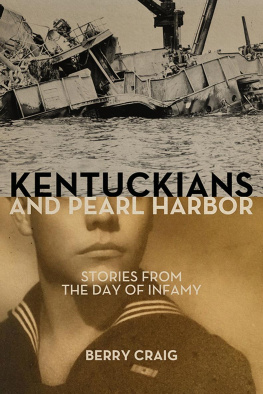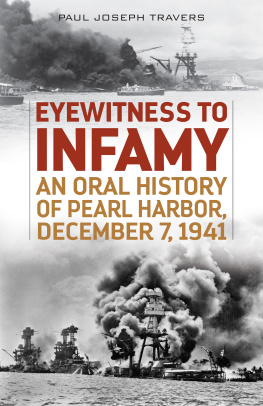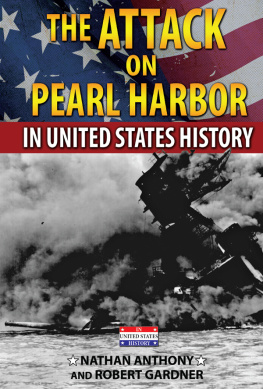D EDICATED TO
MY WIFE AND CHILDREN ,
FIVE GRANDCHILDREN , FIVE GREAT - GRANDCHILDREN ,
AND ALL MY SHIPMATES
TO THE ETERNAL MEMORY
OF OUR GALLANT SHIPMATES
IN THE USS ARIZONA
WHO GAVE THEIR LIVES IN ACTION
7 DECEMBER 1941
MAY GOD MAKE HIS FACE
TO SHINE UPON THEM
AND GRANT THEM PEACE
If men could learn from history, what lessons it might
teach us!
But passion and party blind our eyes, and the light which
experience gives us
is a lantern on the stern which shines only on the waves
behind.
Samuel Taylor Coleridge
Contents
I fear all we have done is to awaken a sleeping giant and fill him with a terrible resolve.
Admiral Isoroku Yamamoto
Commander of Japans Naval Forces
On the afternoon of December 7, 1941, news of the Japanese attack on Pearl Harbor, Hawaii, reached Washington, D.C. Rumors raced unchecked through the corridors of power. The Pacific Fleet, destroyed? The island of Oahu, overrun? Japanese subs, seen off the coast of San Francisco? Japanese troops, mounting an amphibious landing? Japanese spies, living among us?
Switchboards lit up; teletypes chattered. Presses were stopped, broadcasts interrupted.
The West Coast, with its large population of Japanese immigrants, panicked. Schools in California closed. So did businesses. Extra! editions of newspapers sold out as soon as their bundles hit the streets. And suddenly every Japanese-American living here was looked on with suspicion. Some were shunned. Others were harassed. And many, before the wars end, would be displaced, forced to live in internment camps.
As facts were checked and rumors dispelled, shock gave way to the sobering reality that America would be going to warjoining a global conflict it had wanted no part of. From coast to coast, people huddled around their radios, waiting to hear from their president. His fireside chats had gotten them through the Depression. If ever they needed a word from him, it was now.
The presidents two speechwriters were out of town at the time, and so it would be his words, and only his, that the nation would hear. On the evening of December 7, President Franklin Delano Roosevelt called his secretary Grace Tully into his office. Sit down, Grace. Im going before Congress tomorrow, and Id like to dictate my message. It will be short.
By midnight, he had finished. When he awoke the next morning, a typed draft was waiting for him. He went over the speech and dressed for the day.
At noon on December 8, Congress opened a special joint session with a prayer by the Senate chaplain, who called for national unity.
About that time, six limousines pulled up to the White House. Roosevelt walked to the presidential car, silent and somber, pushing his legs, clad in painful braces hidden under his suit. The door of the Cadillac opened, and he eased himself in. Outside his car stood six Secret Service agents, three to each running board, each holstering a .38-caliber revolver. Inside sat four more, with sawed-off shotguns. Security had been ratcheted up all around the capital, not just for the president. Tensions were high. Everyone was wary.
Inside the car the president was poring over his speech, weighing every word. His opening line announced that the previous day would live in history. It now seemed too pale a phrase. He scratched out history. He needed something ruddier, flushed with outrage.
Above it, he printed the perfect wordinfamy.
At 12:20, the presidents motorcade pulled into the parking lot of the U.S. Capitol. When the somber procession stopped, Roosevelt emerged from his limousine, wearing a navy blue cape over his shoulders. His son James was a captain in the Marine Corps and was wearing his dress blue uniform as he took his place at his fathers side.
His arm steadied his father as they made their way to the House chamber. The room was packed with senators, representatives, justices of the Supreme Court, and members of the presidents cabinet, along with the highest-ranking military leaders. His wife of thirty-six years, Eleanor Roosevelt, watched from the upstairs gallery, which was filled to capacity with more than five hundred people eagerly waiting for the president to speak.
The entire nation was an extension of that audience, gathering around radios. In Red Cloud, Nebraska, my family collected before a wooden, battery-operated radio that sat on a windowsill in the living room for better reception. It was now 12:30 P . M ., and the gears of commerce halted, not just in tiny Red Cloud but in every town and city where those radio waves reached.
When all were seated, the Speaker of the House, Sam Rayburn, announced: The President of the United States. The cavernous chamber erupted in cheers and applause. Still steadied by the arm of his son, the president walked the aisle, giving no greetings, shaking no hands, offering no smiles. He stepped onto the ramp to the podium, one measured step after another. As the cheers and applause reached a crescendo, even Roosevelts most strident opponents were wiping tears from their eyes.
An American flag hung vertically behind the dais, framing the president. An expectant hush fell over the room. He placed on the podium a black, loose-leaf, schoolboys notebook that held fewer than three pages of words. He spoke without gestures. His voice was clear. His language, measured. His tone, resolute. And just behind his words burned the anger of a nation that had been so violently awakened.
Mr. Vice President, Mr. Speaker, Members of the Senate, and of the House of Representatives.
Yesterday, December 7th, 1941a date that will live in infamythe United States of America was suddenly and deliberately attacked by naval and air forces of the Empire of Japan.
The United States was at peace with that nation and, at the solicitation of Japan, was still in conversation with its government and its emperor looking toward the maintenance of peace in the Pacific.
Indeed, one hour after Japanese air squadrons had commenced bombing in the American island of Oahu, the Japanese ambassador to the United States and his colleague delivered to our Secretary of State a formal reply to a recent American message. And while this reply stated that it seemed useless to continue the existing diplomatic negotiations, it contained no threat or hint of war or of armed attack.
It will be recorded that the distance of Hawaii from Japan makes it obvious that the attack was deliberately planned many days or even weeks ago. During the intervening time, the Japanese government has deliberately sought to deceive the United States by false statements and expressions of hope for continued peace.
The attack yesterday on the Hawaiian Islands has caused severe damage to American naval and military forces. I regret to tell you that very many American lives have been lost. In addition, American ships have been reported torpedoed on the high seas between San Francisco and Honolulu.
Yesterday, the Japanese government also launched an attack against Malaya.
Last night, Japanese forces attacked Hong Kong.
Last night, Japanese forces attacked Guam.
Last night, Japanese forces attacked the Philippine Islands.
Last night, the Japanese attacked Wake Island.
And this morning, the Japanese attacked Midway Island.
Japan has, therefore, undertaken a surprise offensive extending throughout the Pacific area. The facts of yesterday and today speak for themselves. The people of the United States have already formed their opinions and well understand the implications to the very life and safety of our nation.
As Commander in Chief of the Army and Navy, I have directed that all measures be taken for our defense. But always will our whole nation remember the character of the onslaught against us.
Next page
